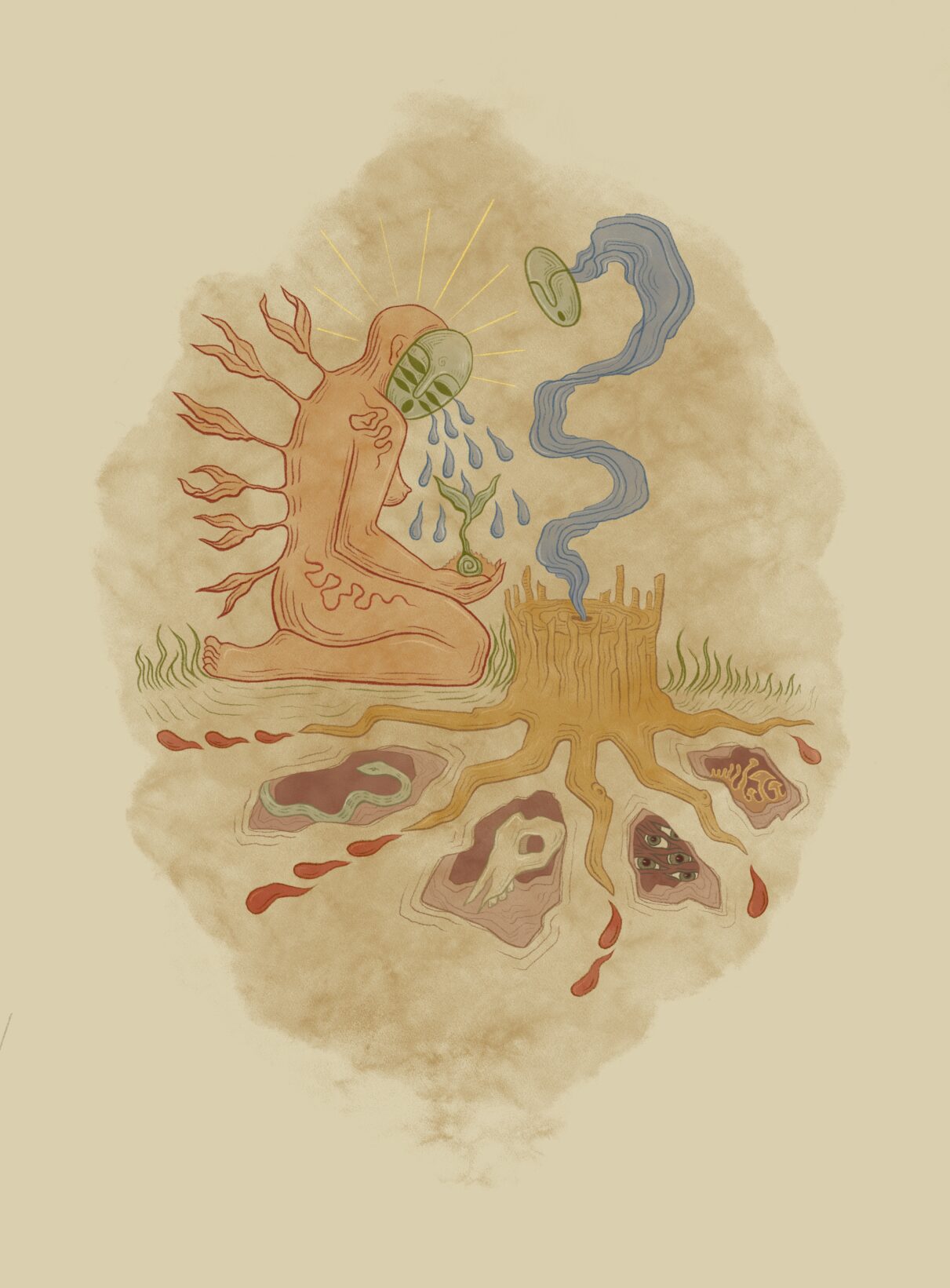“The logic of modernity has been to create artificial boundaries that separate us from each other and from the natural world”
– Arturo Escobar
Since colonisation, over 60% of so-called Australia’s forests have been axed, sawn, bulldozed, chainsawed, burnt, logged and chipped. What hasn’t been turned into suburbia or farmland is highly fragmented. A patchwork of young, regrowing forest crisscrosses once-ancient green landscapes, exposing the pervasive erosion of ecological connectivity and catapulting collapse. Ecological collapse is real. Here. Now. One in five countries are at risk of their ecosystems collapsing.
Imagined, invisible, human-induced geographies have the power to disconnect and disintegrate the visceral ecosystems of physical reality. These are the systems that hold all life. The looming extinction of Mountain Ash Forests, listed by the International Union for Conservation of Nature as a collapsing ecosystem, are a pertinent example of this. Through the state owned and self-regulated logging industry, vast interconnected ecosystems have been reduced to lines on screens—drawn up by government bureaucrats in air conditioned offices under fluorescent lights. Complex ecosystems like these Mountain Ash forests are being dissected into arbitrary shapes known as ‘coupes’, imagined boundaries created solely for maximum resource extraction. These geographical falsehoods are completely disconnected from the environmental reality, ignoring pre-existing ecological vegetation classes, hydrological systems and critical habitat for flora and fauna.
Year by year, hundreds of hectares of critically endangered Mountain Ash forests are cut down in Victoria, 86% destined to become woodchip. When late stage capitalism ignores the intrinsic values of intact ecosystems, the ever churning infinite economic growth imperatives drive us further and further away from a liveable future. Since the proliferation of clear fell logging in the 1970’s, a process in which large tracts of forests are completely flattened by humans in machines, the fragmentation of forest ecosystems has dramatically intensified. Before the radical industrialisation of the logging industry, trees were taken out selectively, limiting the disconnection of ecological geographies. Now, the machines of the industry can easily devastate one hundred hectares of forest in a matter of weeks.
It takes hundreds of years for these obliterated landscapes to recover their ecological resilience and the many benefits that ecosystems provide to human communities, like clean water, air, and medicine. The cumulative impact of more than fifty years of industrial logging cannot be underestimated. Driving along forest roads in places such as Toolangi, Warburton, and Erica evokes a great sense of sadness to the trained eye. The commons here have been exploited to near extinction. Such is the extent of the pervasive environmental fragmentation that there is now less than 1% of the old growth Mountain Ash Forests of the Central Highlands left in so-called Victoria.
As the menacing patchwork of forest destruction infringes on human communities, dedicated and creative campaigns to protect evolve. Local grassroots groups are fighting forest fragmentation through litigation. Logging ‘coupes’ are painstakingly surveyed by volunteer citizen scientists, then receive some bulldozer relief by the issuing of temporary stop work court orders, called ‘interlocutory injunctions’. Injunction by injunction, logging coupe by logging coupe, those lines on screens are dissolved, back to connecting corridors of ecological resistance. Passionate locals and other people from afar come together; they re-member, they connect, and create mycorrhizal networks of defiance.
The human-induced doom spiral of ecosystem and societal collapse is a terrifying concept to behold. There is no one all-encompassing solution to the entropically complex issue at hand. However, the cessation of mass ecosystem genocide driven by endless extractivism would be a good start. As the earth’s physical geographies, the very environments we rely upon for survival, start to fall, humanity needs to hit the pause button. Let’s assess the damage, stop the senseless destruction and do what we can to increase ecological and social connectivity. In order to survive the coming decades, radical reconnection with wild earth and with each other is now essential. Fragmented we fall.








